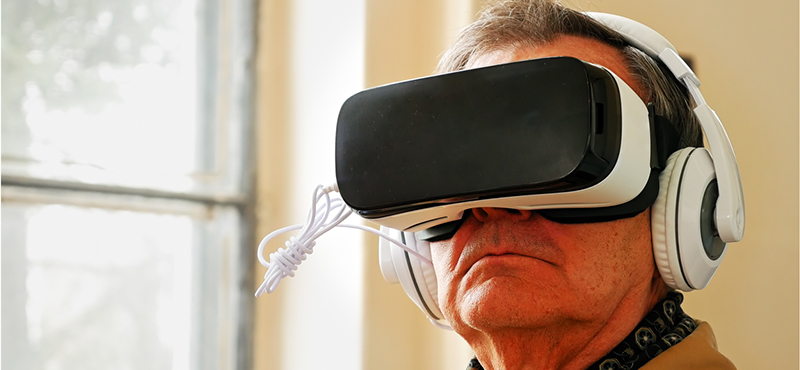The problem
Apathy in aged care homes hastens cognitive decline and can affect up to 84 per cent of older populations. Extremely common among residents, apathy contributes to a poorer quality of life and is associated with a three-fold risk of earlier death compared to those without.
While therapies involving music and art are often used to increase wellbeing, newer technologies may prove more effective and serve as a novel source of enjoyment along the way.
The solution
UniSA’s Dr Dimitrios Saredakis partnered with aged care provider Helping Hand to address widespread apathy and improve mental health in aged care using virtual reality (VR) technology.
The innovative tool for “reminiscence therapy” has enabled seniors to immerse themselves in happy memories from their past through a 360-degree experience.
As part of his PhD project, Dr Saredakis tailored VR experiences for 17 residents at Helping Hand, interviewing them each about their life history with a focus on positive memories.
He then sourced content specifically for each person, and then projected this through a head-mounted display, providing an immersive experience.
This allowed residents to relive autobiographical memories such as travel, favourite places, previous jobs, and family videos.
Dr Saredakis described the feedback from Helping Hand and residents as overwhelmingly positive.
“I saw a visible change in them – the emotional responses were varied, including happy tears, but always positive,” Dr Saredakis says.
“Residents with the highest levels of apathy showed the most improvement. This tells us that using virtual reality may help improve the lives of older adults in residential aged care.”

The partnership also meant Dr Saredakis could apply and transfer his research in a setting that enabled him to work directly with aged care residents and assist with improving their experience at Helping Hand.
“Working with Helping Hand allowed me to understand aged care systems and procedures so I could ensure we were engaging with both residents and their families in the right way while providing person-centred care,” Dr Saredakis says.
“I was also able to build connections with Helping Hand staff at all levels, which was not only important to communicate the outcomes of my research, but also highlighted the value of engaging with UniSA researchers.”
Partners involved

Related services
Contact the Enterprise Hub
Get in touch with us to find out how we can support your business needs.
Make an enquiry online or call us to discuss your idea



